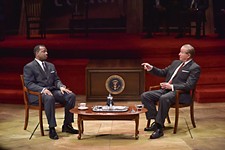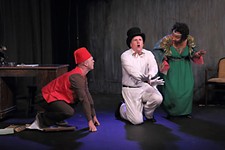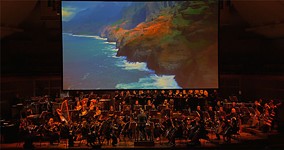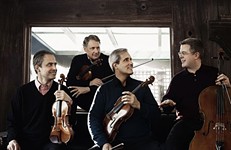House Arrest
Local Arts Reviews
Reviewed by Robi Polgar, Fri., Aug. 13, 2004

House Arrest
Zachary Scott Theatre Center Kleberg Stage, through Sept. 12Running Time: 2 hrs, 25 min
The trouble with modern American political theatre, at least among the plays on Broadway and off, as well as those making the rounds in our nation's regional theatres, is its near frantic personal introspection at the expense of lasting, truly political conclusions. From the two-part, Tony Kushner clock-buster Angels in America to Anna Deavere Smith's House Arrest, playwrights seem trapped in torturous investigation, seeing all sides from all sides, leaving audiences breathless at the scope of the investigation but hardly satisfied by its political drama – if there is any. Theatrical flourishes are no substitute for substantive political discourse, so while we laugh and cry at the characters on their journeys and gape at flying angels, we remain unenlightened about how a character's particular choices connect to our lives. That's them. We're us. They tell their stories, and we get to leave when they're through. And as we leave, we may forget the meaning of what we've witnessed, no matter how compelling the figures or their tales. The politics are lost in the personal.
So it is with Smith's collection of staged interviews – the format for House Arrest as for other of Smith's theatrical investigations. The interviews with 50 or so individuals (from the 400 people Smith spoke to in researching her topic) range from intriguing to funny to heartrending to out-of-place. Smith attempts an all-sides-of-all-sides exploration of what it means to occupy or observe the presidential persona. From those who have encountered commanders-in-chief, such as writer Studs Terkel, documentary filmmaker Ken Burns, RW Apple of The New York Times, or relative "nobody" Alice Waters (owner of a restaurant where Clinton once stopped for a bite), to several presidents themselves, Smith's work offers a broad range of opinions on the presidency and life in the orbital world around it, yet without articulating any conclusions. By evening's end, we know more trivia about our nation's various chief executives, but what about this question of them and all these others living in various states of arrest? There's no dramatic arc to the work and no political enlightenment. It's a social services report, not a play.
And among the voices of this report, the connective threads to the presidency are sometimes too slender to merit inclusion. No one will argue that Alexis Herman's and Paulette Jenkins' monologues aren't harrowing pieces of dramatic literature (both beautifully performed by Carla Nickerson in Zachary Scott Theatre Center's staging), but these are tales about the ongoing African-American struggle for equality, not the presidential nebula. The Jenkins monologue, for all its power, may be the most manipulative piece of theatre I have ever seen. It is violent, it is morbid, it is desperate and hopeless. Whatever has it to do with the White House, save that the woman is in a penitentiary in a state that includes within its borders Washington, D.C., home of the president? It's up to the artistic team to help make a viable connection, but Zach's production falls short.
The monologues are divided into nine major sections (Thomas Jefferson and slavery, proximity and aloofness in FDR's administrations, presidential assassinations, sex and the presidency, et al.), but the indications where one section ends and the next begins aren't always clear. The performances are uneven, too: While Martin Burke acts his heart out in his many roles, returning guest artist Everett Quinton, charming though he is, offers basically one character. Barbara Chisholm (who is the Chronicle Community listings editor and is also married to Arts Editor Robert Faires) is at her best portraying some of the work's less famous characters, particularly cafe madam Waters, and Karen Kuykendall relishes playing Ann Richards. But they, too, seem to find one particular rhythm and linger too long in it.
It doesn't help that director Dave Steakley and video designer Colin Lowry tend toward the obvious with their projections. Whereas Smith suggests the use of slides with the speakers' faces in an attempt at clarity, Steakley and Lowry offer the literal to underscore various points in the text: Being president is like living in a fishbowl; cue the video of the fishbowl. Jefferson's brothers killed a slave for breaking a teacup; cue the video of a breaking teacup. Too often director and designer opt for the simple when the actors – and our imaginations – would be better served with nothing onscreen. Odd, too, is the gorgeous carnival/sideshow setting by Cliff Simon that is never really explored in the context of the script. It is there but disconnected from the language.
Ultimately the work may be nothing more than a remarkable poet's investigation of language, with the presidency a jumping-off point, though this analysis, too, sees the production fall short of fulfilling itself. So the work is a slice – or many slices – of American life, loosely cobbled together, though hardly unified, under the purported theme of the presidency. It is certainly a good thing that Zach is working hard to produce politically minded plays in this highly charged political season, and it will be interesting to see how Steakley and company attack the upcoming Omnium Gatherum, a much more shocking political conversation but a conversation nonetheless. Meanwhile, Smith's monologues are on offer, exemplifying how hard it is to create a work that is digestible for a mainstream audience but that maintains some political impact.










